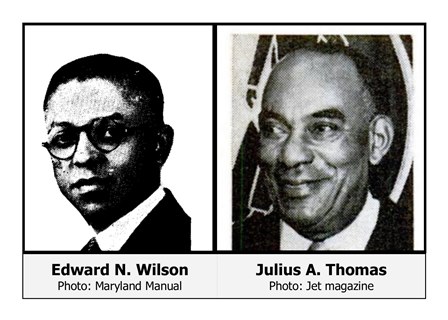
Maryland State College placed a full-page ad in the Afro-American newspaper in early August 1955 hoping to attract prospective students and the attention of their parents.
“The growth of Maryland State, the historic college on the Eastern Shore,” the advertisement reads, “has developed into a remarkable institution since its founding sixty-nine years ago.”
Along with a synopsis of the school’s history, it mentions the 1954 commencement speaker, former First Lady Eleanor Roosevelt, and the recent addition of an Air Force Reserve Officer Training Corps program.
The recruiting ad also noted that in the spring of 1955, “the College gave its first honorary doctoral degrees to a former student, Mr. Edward N. Wilson Sr., Registrar of Morgan State College, and a New York resident, Mr. Julius A. Thomas of the National Urban League.”
Awarding honorary degrees marked an important milestone in Maryland State’s history. The college, in essence, declared itself a full-fledged member of the larger higher education community by embracing a tradition that traces its origins to the Middle Ages.
While not widely recognized household names, Thomas and Wilson nonetheless were accomplished African Americans.
Wilson was from Fairmount, Md., a low-lying Somerset County community flanked by the Manokin and Big Annemessex rivers southwest of Princess Anne.
He attended Princess Anne Academy, from which he graduated in 1916. He continued his studies in Baltimore at then-Morgan College, where he earned a degree in 1921 and immediately accepted a job offer to be registrar. He held that post until he retired in 1962.
An April 1963 profile of Wilson in the Afro-American newspaper proclaimed that he “can rightfully lay claim to being one of the ‘fathers’ of the new Morgan State College.”
The article credits him with successfully campaigning in the late 1930s to convince the state of Maryland to acquire Morgan from the Methodist Church, and make it “a state supported college for colored students.” When the state agreed in 1939 — three years after it committed to paying the church $100,000 for Princess Anne College — Wilson described the transition as “one of the happiest days in my life.”
Wilson also was secretary of the State Scholarships for Negroes program, which the Maryland Manual of that era described as responsible for distributing financial aid “to qualified Negroes of the State for the pursuit of professional and graduate studies not available to them in the State.”
His long association with Morgan made him the school’s de facto historian. Morgan recognizes Wilson’s role as an influential figure by including his name along with two others on the university’s administration building.
Thomas served as spring commencement speaker twice during the Maryland State College era; the first in 1950 and the second time in 1969, four years before he died.
A World War I veteran, the Greensboro, N.C. native was an Urban League fixture for four decades, starting in Atlanta in 1924 before moving on to similar posts in Jacksonville, Fla. and then Louisville, Ky. In 1943, Thomas was appointed industrial relations director of the National Urban League, where his efforts to expand job opportunities for Blacks in manufacturing plants during World War II and afterward had broad and lasting implications.
Published obituaries took note of his success in convincing General Electric to be the nation’s first major corporation to visit a historically Black college, (his alma mater) Howard University, to recruit employees.
Among Thomas’ career honors were the Congressional Selective Service Award, the John Brown Russwurm Award from the National Newspaper Publishers’ Association, the City of New York Citation for Distinguished and Exceptional Services and three other honorary degrees.
It would be another 10 years before Maryland State, under the administrative jurisdiction of the University of Maryland in College Park, would issue its third honorary degree — this time to Whitney M. Young Jr., a noted civil rights activist who lead the National Urban League. Three years later, Major League Baseball immortal Jackie Robinson received the institution’s fourth honorary degree.

